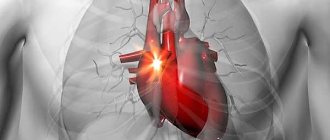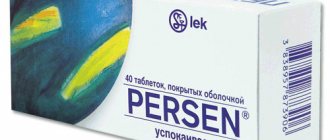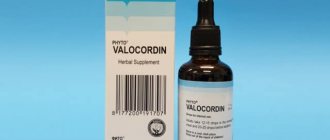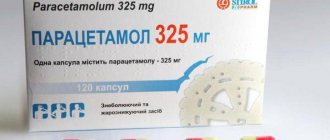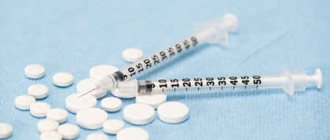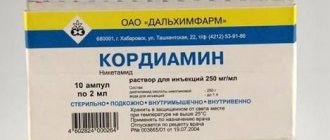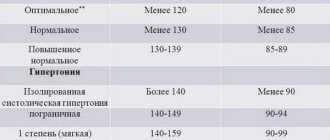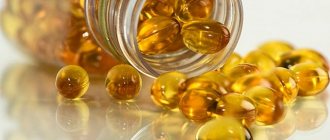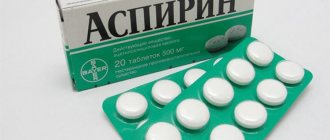Why does valerian lower blood pressure?
Valerian has a complex effect on the body.
Moreover, the influence on pressure is one of its secondary actions. First of all, valerian affects the functioning of the central nervous system, reducing its excitability, weakens spasms of smooth muscle organs, has a slowing effect on the medulla oblongata and midbrain systems, and increases the functional mobility of cortical processes.
Valerian also affects the functioning of the heart, the condition of the coronary vessels and blood pressure. Due to its effect on the central nervous system, valerian has an indirect effect on the heart, normalizing heart rhythm. In particular, borneol contained in valerian has a direct effect on the coronary vessels and improves coronary circulation. A decrease in blood pressure after taking valerian occurs as a result of vasodilation.
Valerian tincture (aka drops) reduces blood pressure stronger than tablets due to the presence of alcohol in its composition
Medicines based on valerian are used in complex therapy at the initial stages of angina pectoris and hypertension. They allow you to gradually normalize blood pressure and prevent sudden changes. Valerian tincture is most often used, since it contains a small amount of ethyl alcohol, which also leads to vasodilation and lowers blood pressure.
Contraindications and side effects
Valerian tincture for hypertension should not be taken by people with disorders of the gastrointestinal tract, as well as with alcohol dependence. The tincture is contraindicated for low blood pressure, since valerian does not increase blood pressure and can further lower the levels. Pregnant women and during lactation should not take this drug containing alcohol.
A drug based on valerian should not be taken if you have enterocolitis or hypersensitivity to the components.
Valerian reduces blood pressure, but the use of a harmless herbal remedy can cause unwanted reactions:
- apathy;
- digestive disorders;
- sleepy state;
- gagging;
- dizziness;
- headaches.
Adverse reactions appear only with prolonged use of the drug. They may be the body's reaction to an overdose.
Is there a connection between psycho-emotional stress and high blood pressure?
Psycho-emotional stress provoked by an unpleasant situation entails a lot of alarming symptoms: rapid pulse, difficulty breathing, low or high readings on the tonometer needle. All of the above will quickly return to normal as soon as the irritant loses its influence on the body.
Stress does not cause hypertension, but it does contribute to its onset. The constant active effect of adrenaline and cortisol on the body can develop into ischemia and subsequently hypertension. Abuse of alcohol and tobacco during periods of nervous shock also contribute to the aggravation of hypertension and hypotension.
Which components of plant preparations affect blood pressure?
Valerian roots contain more than 100 substances in varying quantities. The main therapeutic effect is provided by the components of the essential oil, the amount of which reaches 0.5-2%. Valerian rhizomes contain:
- Valepotriates, which cause an antispasmodic effect;
- Glycosides, borneol, acting primarily on the heart and leading to dilation of the coronary vessels;
- Alkaloids that provide a sedative effect;
- Essential oils and resins – calming effect on the central nervous system;
- Organic acids that provide a choleretic effect and stimulate appetite.
Valepotriates and borneol have the greatest effect on reducing blood pressure. Their action is already complemented by the effect of essential oils and resins.
The composition of valerian drops and alcohol tincture contains a significant amount of alcohol, which also reduces blood pressure, sometimes more than valerian itself. Therefore, such drugs (with proper prescription and preliminary diagnosis) are more preferable than tablets and capsules, or aqueous preparations of the root.
Typical composition of valerian drops
Is it possible to drink valerian with low blood pressure?
Drinking valerian for hypotension is not recommended, since it does not raise blood pressure, but on the contrary, it can reduce levels to critical limits.
In general, doctors prohibit people with low blood pressure from taking any medications with a sedative effect. Valerian, although it is a herbal remedy and has a mild effect on the body, also falls under this ban. After taking it, the pressure decreases, which can be dangerous for hypotensive patients.
Instructions for use of Valerian tablets
Taking medication depends on what problem the patient needs to eliminate, as well as on his individual characteristics. A general course of 14 or 30 days is prescribed to relieve stress, headaches, and normalize heartbeat. Use 2-4 pills per day. According to the instructions, drink them strictly after meals twice a day.
For adults
Valerian for depression, irritability, hysteria and other problems of the nervous system can be used as a stand-alone drug or together with other medications. Children over 12 years of age and adults are recommended to use the product no more than 4 times in 24 hours. To reduce the aggressiveness of the effect on the gastrointestinal tract, you should not take the medicine on an empty stomach.
For children
Sometimes doctors prescribe this natural sedative not only to adults, but also to children. It is important to consider that it is not recommended to give medicine to children under three years of age, because their liver cannot process and remove the components included in the tablets. If the tincture, according to indications, can be taken by children over 1 year old, then the pills are allowed only for adolescents over 12 years old.
Using valerian root for hypotension
With low blood pressure, it is not recommended to treat emotional shocks with sedatives. Low tonometer readings often cause chronic fatigue and loss of strength, and sedatives slow down processes, slow down the pulse and further weaken the body, leading to drowsiness. For people suffering from hypotension, such therapy is unacceptable, as it can worsen the situation. For hypotensive patients, invigorating formulations containing ginseng and eleutherococcus have been developed.
Having found out all the pros and cons regarding the use of valerian during blood pressure surges, you should not start actively purchasing the drug. Despite its properties and relatively inexpensive price, it also has contraindications and side effects.
Who is not recommended for treatment with valerian:
- Ulcerative diseases of the digestive system.
- Atherosclerosis and predisposition to the disease.
- Stroke, heart attack.
- Enterocolitis. Individual immunity.
- Allergic reactions.
- Pregnancy and lactation period. Use is possible only with a doctor's prescription.
- Chronic pathologies of the liver and kidneys.
It is not recommended to normalize sharp fluctuations in pressure surges using valerian. It does not have a serious impact on the performance. There is also a patient intolerance to the strong smell of the plant. It is extremely rare that opposite consequences occur, and instead of reduced indicators, the problem can be further aggravated. The emotional state is strained to the limit, irritability and sleep disturbance appear.
Side effects
- Efficiency and brain activity decreases.
- Concentration is impaired and forgetfulness occurs.
- Muscle tissues lose tone.
- Clarity of actions is lost.
- Retardation appears. Weakness appears and a constant desire to sleep.
- Itching, redness, rashes are allergic manifestations.
- Nausea, dizziness, headache.
- Increased blood clotting, leading to thrombosis.
- Depression, apathy.
Valerian root is a unique healing plant. Its structure contains more than 100 inclusions: etherols, bornyl isovalerate, camphene, pinene, terpineol, valeric acid, sesquiterpenoids, astringent components, alkaloids, organic acids, amines.
Such a harmless drug has well-founded contraindications, which, if not followed, can cause serious health problems. Adverse reactions are also possible, which most often occur when dosages are not observed.
Contraindications:
- pregnancy and breastfeeding (the exception is when the drug is prescribed by a gynecologist in special cases, for example, when there is a threat of miscarriage due to emotional turmoil);
- individual intolerance to components, including allergy to valerian;
- the tablet form of the drug is also contraindicated in cases of congenital fructose intolerance, glucose-galactose malabsorption, sucrase/isomaltase deficiency, children under 12 years of age;
- tincture, in addition to the above, is contraindicated in children under 14 years of age, with gastritis and ulcers, with epilepsy, hepatitis, alcoholism, while taking antibiotics and when taking the drug "Teturam".
Adverse reactions:
- nausea;
- dizziness;
- feelings of anxiety;
- apathy;
- drowsiness;
- oppression, depression;
- inhibited mental activity, absent-mindedness;
- forgetfulness;
- weakness;
- constipation;
- allergy;
- a strong decrease in pressure or, conversely, an increase in pressure.
Valerian also enhances the effect of sleeping pills, sedatives, sedatives, and antispasmodics.
Valerian can lower blood pressure, but it is not recommended to use it as an antihypertensive agent, since it is not directly intended for this purpose. It can be used in combination with blood pressure-lowering medications, as well as to calm down from worries and other nervous disorders.
Long-term use of valerian can cause:
- depressed and depressed state;
- desire to sleep;
- intestinal disorder;
- allergies;
- decreased attentiveness.
Unpleasant sensations in the abdomen may be a sign of taking a high dose of the drug.
If such symptoms are present, it is recommended to refrain from drinking alcohol, driving a car and performing work that requires concentration and attention. An overdose of the drug is characterized by dizziness, weakness, headaches, discomfort in the abdomen, tremors in the hands and tachycardia. In this case, it is advisable to immediately go to the hospital.
Does valerian affect the appearance of tachycardia?
This question may worry many, but in fact, the only provocateurs of tachycardia are alcoholic drinks and unusual or spicy foods. In this case, the body seems to find itself in a stressful situation, adrenaline is released, and therefore the heartbeat quickens.
As for the tincture of valerian in alcohol, it is not recommended to abuse this alcoholic medicine. Because you can get the opposite effect.
In conclusion, we can say that tachycardia can become a real danger to human health, so it must be dealt with moderately and not delayed. Having tried valerian to combat the disease, you can see that it effectively helps.
How to take valerian for hypertension
In case of hypotension or temporary low blood pressure, the use of valerian is not recommended, regardless of its form of release. The plant can further lower blood pressure and worsen the patient's condition. However, this does not pose a great danger; it will only add unpleasant symptoms.
The instructions for neither the tablets nor the valerian tincture contain information about use for high intracranial pressure. In folk medicine, a tincture of valerian, hawthorn and motherwort is used as an antihypertensive agent, but the effectiveness of this drug has not been confirmed.
At any pharmacy you can buy valerian extract in tablets, tincture or herbal mixture. Valerian tincture and extract are also included in various medicines, for example, Corvalol, Persen, Novo-Passit.
For the treatment of hypertension, it is better to replace valerian with more effective drugs
The choice of drug form depends on the indications for use and the individual characteristics of the patient. For example, valerian tincture consists of 70% alcohol, and it should not be drunk by children, people with alcohol intolerance, while driving, etc. Valerian tablets contain only powder of crushed rhizomes and roots.
When treating hypertension, valerian tablets or tincture are most often prescribed. The dosage is determined by the doctor individually. Usually 1-2 tablets or 20-30 drops are prescribed 2-3 times a day. Your doctor may also recommend Corvalol. It contains alpha-bromoisovaleric acid ethyl ester, which helps lower the pulse and reduce high blood pressure.
Valerian medicine can also be prepared at home. For example, you can pour 1 tsp. crushed valerian rhizomes with a glass of boiling water and leave for 12 hours, and then take 1 tbsp. 3 times a day. This tincture is also great against pressure.
The properties of valerian include:
- improving the functioning of nerve cells;
- decreased blood pressure;
- relieving tachycardia and seizures;
- expansion of coronary vessels;
- increased bile production;
- reduction of chest pain.
The component composition of valerian has a calming and pacifying effect, slightly increases blood pressure and helps even with severe hysteria. Valerian is also taken as an analgesic, antispasmodic and sleeping pill if pain and sleep disturbances are caused by a stressful situation or nervousness.
does valerian help with heart pain?
What to do if you have heart pain?
It is best to consult a doctor as soon as possible if you experience heart pain, and in the event of a severe attack, call an ambulance, since this condition is potentially life-threatening.
At the same time, you cannot sit back and wait for doctors to come to your aid. Moreover, sometimes the medical team takes a lot of time to get to the place. Therefore, everyone needs to know the rules of emergency care for heart attacks. And also have in your home medicine cabinet the necessary medications that should be taken before the doctor arrives.
1. You can help yourself during an attack of heart pain by placing a regular aspirin tablet under your tongue (after taking it, your mouth should be rinsed thoroughly with water).
2. Nitroglycerin can also be used to relieve an attack. But only under one condition: if there is absolute confidence that blood pressure is not reduced.
Remember: nitroglycerin is a serious medicine for heart pain; it should only be taken by those who know for sure that this particular remedy was recommended to them by their attending physician.
3. If pain in the heart is accompanied by attacks of cardiac asthma (suffocation, feeling of lack of oxygen), calling an ambulance is mandatory. While waiting for the doctor you should:
• open the window, providing oxygen access to the room;
• lie down on the sofa with two or three pillows under your head;
• take medication: which one - it is better to ask your doctor about this in advance (for example, the same nitroglycerin, if there is no hypotension). Tincture of valerian or valocordin will help stop an attack.
4. If pain in the heart recurs periodically, it is very important to be examined and find out the diagnosis.
In this case, you will know exactly what causes the pain and how best to deal with it. After all, the approaches can be completely different, for example:
if the patient needs fresh air and nitroglycerin with angina pectoris, then valerian and peace of mind will help relieve the pain caused by neurosis.
By the way, physical rest in this case is not at all necessary. On the contrary, moderate exercise will improve your mood and distract you from painful feelings in your heart.
Such drugs as sustak, sorbitol, nitranol, nitrosorbitol relieve pain in the heart. True, they do not act instantly, but after 10-15 minutes, so they are not recommended for use during a severe attack. If heart pain occurs due to increased blood pressure, take a fast-acting medicine that lowers blood pressure, for example, Corinfar.
Sharp, severe pain may indicate a myocardial infarction. In this case:
• an ambulance should be called as soon as possible;
• while waiting for doctors, the patient should be seated on a sofa or chair (but not laid down);
• feet can be lowered into a basin of hot water, adding mustard;
• it is recommended to put a validol tablet under the tongue, you can also drink 40 drops of valocordin or corvalol. For very severe pain, nitroglycerin can be used.
If heart pain occurs for the first time:
• take 40 drops of Valocordin or Corvalol, you can put Validol under your tongue. If these drugs are not found in your home medicine cabinet, take an aspirin and analgin tablet together, washing them down with 150 ml of water;
• if the pain does not subside within 15 minutes, but intensifies, it is better not to take risks, but to call an ambulance.
Remember that it is often impossible to reliably determine the cause of heart pain without examination at a medical facility. In some cases, self-medication and refusal to seek medical help can be costly.
Source: www.e-reading.club
Is valerian tablets harmful?
My mood lifted from reading the forum :))) And I was naive, I tried to calm down with the help of one pill)))) I decided to take it every day - to calm down. I still don't understand if it works or not.
but it turns out you need to drink more:)))) yoga, meditation and breathing exercises - pranayama - help a lot - the mind calms down and becomes better and lighter. I recommend! And you will be healthier... Fortunately, I am also nervous, I take everything to heart and all sorts of moments that concern the young man influence.
This is how our life is now, nothing but stress. You need to not eat them up with pills, but get to know yourself. Good luck to you all!
May the positivity be with you :)!
Valerian probably only works on cats. I drank a bottle of tincture per sitting, and it didn’t even get any easier. Azaleptin helps.
Nothing will happen, even if you take 30 tablets. one tablet is 5-10 mg, and people in Norway with their experiment drank 200 mg and nothing. And the effect of valerian, by the way, has not been proven.
“ more fun"
Guys, I think valerian is complete crap, I remember at school the 8th grade, I fought very often, for this reason I received punishment at home! I bought 2 bottles of valerian and ate them all at once! There was no action at all.
Source: https://folkmap.ru/krov/pomogaet-li-valeryanka-ot-boli-v-serdtse/
Recipes for teas that are effective for hypertension
- Valerian root, hop cones (1 part each), peppermint and shamrock (2 parts each), combine everything and prepare tea in the traditional way. The best results can be achieved by drinking this drink daily.
- The collection of valerian is combined with chamomile flowers, fennel, caraway seeds, and mint. Drink during symptomatic manifestations that increase blood pressure.
- Root, chamomile extract, caraway seeds, motherwort and fennel, all ingredients are combined in equal parts. It has a positive effect on the cause that excessively increases the tonometer readings.
Valerian is appreciated in folk and traditional medicine. It has effective sedative properties. All dosage forms are able to relieve the patient from unpleasant symptoms, rapid heartbeat, convulsions, and pain. If the cause of high blood pressure is caused by mental disorders, then valerian will easily cope with the situation.
What the scientific literature says
Over the past three decades, more than 200 scientific studies have been conducted in Europe examining the effects of valerian on the body. Most of them have proven the effectiveness of the drug in the treatment of insomnia, stress and nervous tension.
There have been no studies that have proven the exact effect of valerian on blood pressure levels. However, in an open randomized study conducted in 2002 by M. Cropley et al., it was found that in volunteers who took valerian extract for 30 days, in stressful situations, blood pressure and heart rate did not increase and remained within normal limits . This indirectly indicates the ability of drugs to reduce blood pressure.
However, it is necessary to take into account, firstly, the relatively weak hypotonic effect of valerian, and secondly, its inability to stop sudden surges in pressure - to obtain a pronounced effect, you need to take its preparations for several weeks. As a result, more or less significant problems with blood pressure should only be resolved with a doctor who can find out the reasons for its increase and select the most effective means to reduce it. If in a particular case it would be advisable to take valerian, your doctor may prescribe it.
Diagnosis and treatment of tachycardia
Heart rhythm disturbances pose a serious threat to the body, therefore, to successfully eliminate the problem, it is necessary to choose the right medications. To select drug treatment, it is important to determine the type of tachycardia.
- Sinus (nodal) is a disease that develops as a result of a malfunction of the sinus node, which is the source of electrical impulses and is responsible for normal heart rhythm. The disease is a consequence of angina pectoris, myocarditis, heart failure, myocardial infarction. The heart rate increases to 120-220 beats per minute.
- Ventricular is a pathology in which the heart rhythm generator is located in the ventricles. The main causes of development are cardiomyopathy, coronary heart disease, congenital heart disease, myocarditis, heart surgery, and hereditary pathologies. There is a possibility of developing complications: ventricular fibrillation, sudden cardiac arrest, leading to physical death.
- Supraventricular (supraventricular paroxysmal) - a disease generated by a violation of the heart rhythm in the supraventricular region of the heart. It is characterized by a sharp paroxysmal increase in heart rate. The causes are cardiac and extracardiac in nature. Among the heart diseases there are: inflammation and dysfunction of the heart muscle, coronary disease and heart defects of varying severity. Extracardiac include: disorders of the endocrine, pulmonary and autonomic nervous systems, alcohol abuse.
- Atrioventricular is a pathology characterized by the physiological structure of the heart - a wide coronary sinus that takes on a funnel shape. Pulse in case of illness is from 140 to 250 beats per minute. It is not associated with heart disease; in 70% of cases it occurs in women for an unknown reason.
After collecting an anamnesis and an electrocardiogram, antiarrhythmic drugs are prescribed to stop and prevent further attacks in combination with herbal medications.
To successfully combat tachycardia, you need to give up alcohol and smoking, products containing caffeine and cocoa beans, restful, long sleep, a state of comfort during the day, walks in the fresh air, and elimination of stressful situations. The goal of treatment is to stabilize cardiac tone.
In ancient times, when there were no modern medical treatments, people successfully treated heart ailments with the gifts of nature. How to help a sick heart? Many recipes have survived to this day and help when the heart hurts and the hand goes numb.
Garlic
Eating two cloves of garlic daily will help prevent heart pain.
Attention! Garlic should not be eaten if you have diseases of the stomach or pancreas.
Hawthorn
- take red hawthorn berries – 20 g and lemon balm herb – 15 g;
- put in a glass, add boiling water and place in a water bath;
- cook for 20 minutes, then cool and strain through cheesecloth.
You can drink 20 ml of the infusion before each meal. The course of treatment is two days.
You can also make a hawthorn tincture: the berries are poured not with water, but with vodka and infused for 14 days in a dark place.
Herbal collection
To prepare the dosage form, you will need herbs of succession, motherwort, lingonberry leaves and chamomile flowers with hawthorn; take 20 g of them and mix thoroughly. Now take 25 g of the composition, place it in a glass and pour boiling water over it.
The recipe is useful because it can be prepared at any time. The medicine is in the form of an infusion; to prepare it, you need to pour 60 g of wild carrot seeds into 250 ml of vodka. The product is infused for 20 days in a cool place protected from sunlight.
Heather grass
An infusion is prepared based on the plant, which will help eliminate pain. During the preparation process, 10 g of dry plant is poured with 200 ml of boiling water and infused in a water bath for 5 minutes. Drink 50 ml every 4 hours.
May lily of the valley
This recipe is time-tested; it has reached our days from ancient times. How to cook:
- take a liter jar and fill three-quarters of the plants with flowers;
- pour vodka up to the neck and cover with a lid;
- leave for 20 days, then strain.
To use, you need to dissolve 20 ml of tincture in water. Take water in a ratio of 1:10. Drink no more than three times a day.
Attention! The plant is very poisonous and should be used with caution.
Mint and lemon balm
These plants will not cope with heart pain, but will calm the nerves, which will have a beneficial effect on treatment. The recipe is simple:
- 25 g of herbs are poured into 250 ml of boiling water;
- leave for an hour, then filter;
- drink 25 ml 20 minutes before meals.
Attention! Mint lowers blood pressure.

